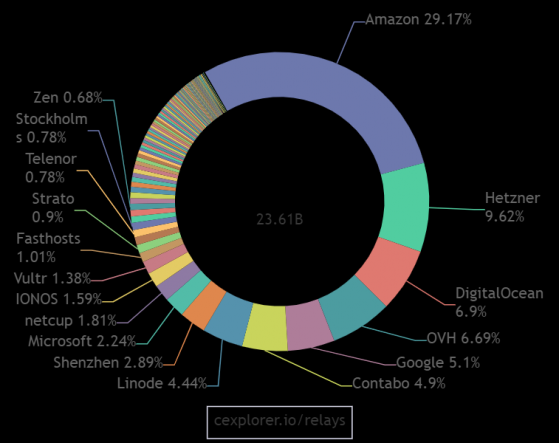Italian e-commerce company Sellix is a long-standing customer of German data-hosting group Hetzner.
As a company that provides a payment gateway for cryptocurrencies in a similar vein to Shopify, Sellix rents up to 10 dedicated servers from Hetzner on any given month in order to conduct its crypto payment services.
However, upon recently requesting more servers to facilitate growth, Sellix was informed by Hetzner that it will no longer be allowing any cryptocurrency-related activity on its network.
While Hetzner said it will honour Sellix’s existing contract, in written communication the company stated: “The rise of cryptocurrencies over the past few years has led to a lot of interest in servers like the ones we offer. These servers are then used for various purposes to participate in the cryptocurrency ecosystem.
“Unfortunately, many of these activities have an adverse effect on our network and servers. As a result of this, these activities are prohibited.”
This came as a surprise to Sellix’s co-founder Daniele Servadei, considering Hetzer’s terms of service don't specifically mention such a policy.
While the terms do prohibit cryptocurrency mining operations, Hetzner has seemingly enacted a sweeping ban on anything even remotely crypto-related.
“Due to the problems in this area, we currently want to completely exclude everything that has to do with cryptocurrency, including (RPC) nodes and blockchain data,” read Hetzner’s letter to Servadei. (An RPC node is simply a piece of software that reads blockchain data.)
Hetzner’s sweeping crypto ban raises a couple of questions, mainly regarding the justification for the ban.
Despite the cited adverse effect on the company’s network, specific details were not provided as to how or why, and the company has yet to respond to requests from Proactive.
Servadei surmised that the sweeping ban was a reactionary move to the recent bad press surrounding cryptocurrency, particularly the FTX collapse, as opposed to a technical one.
“They have made similar comments in the past, but way less severe than what they’ve told me now,” said Servadei. “What they have told us is no, you cannot have anything to do with cryptocurrency on our network… They’re basically doubling down on everything.”
Hetzner exposes a decentralised blind spot
Hetzner is well within its right to preclude any network activity it sees fit, and there is a myriad of other data hosts to choose from, but the situation exposes a critical weakness when it comes to blockchain decentralisation.
Most blockchain networks operate on the ‘51% rule’, where as long as more than half of the network is healthy, it remains in working order.
Any decentralised blockchain worth its salt lives on network validators spread across the globe, making hacking next to impossible.
But Hetzner, funnily enough, recently set alarm bells ringing when it banned all Solana activity on its servers, instantly taking over 1,000 validators offline.
“We require you to delete all activity regarding Solana in order to get your servers unlocked,” Hetzner’s customers were told in an email, continuing: “Our system policy stated clearly that we do not allow cryptocurrency on our servers, so it shouldn’t come as a surprise when you act.
“Please remove Solana permanently on all your servers to get your server unlocked.”
Only 20% of the network was brought offline (Solana operates on a 39% rule), so the wider network was not harmed, but instances like this show how easy it could be for a centralised server to drastically derail a blockchain network.
“It was super easy to get set up on Hetzner, and as a result, many low-quality validators just defaulted to using Hetzner as it was quick and simple for them, even if it wasn’t the best choice,” the anonymous founder of Solana staking platform SolBlaze told Decrypt.
????⚠️ Hetzner just kicked off all @solana nodes hosted on their infrastructure. ⚠️????Over 20% of stake weight on mainnet-beta is delinquent, with thousands of validators offline.
If you are running a Solana validator using Hetzner, please switch to a different provider ASAP. pic.twitter.com/rkXwKvXGVx
— SolBlaze.org | Stake with us! ???????? (@solblaze_org) November 2, 2022
Despite Hetzer’s sweeping ban on Solana activity, other blockchain networks continue to be hosted on its servers.
Nearly 10% of the US$10.8bn Cardano blockchain, the largest of the so-called ‘Ethereum killers’, lives on Hetzner, according to Cexplorer data, while nearly a third lives on Amazon (NASDAQ:AMZN) Web Services (AWS).
Amazon Web Services is one of the primary providers of cloud storage for cryptocurrencies – Source: cexplorer.io
Reassuringly for blockchain operators, Hetzner’s policies have yet to be copied by AWS or any other provider for that matter.
Servadei is in the process of migrating Sellix’s operations to a new server, and he has yet to notice any reticence from alternative providers.
Hetzner has been approached for a comment.
Read more on Proactive Investors AU
